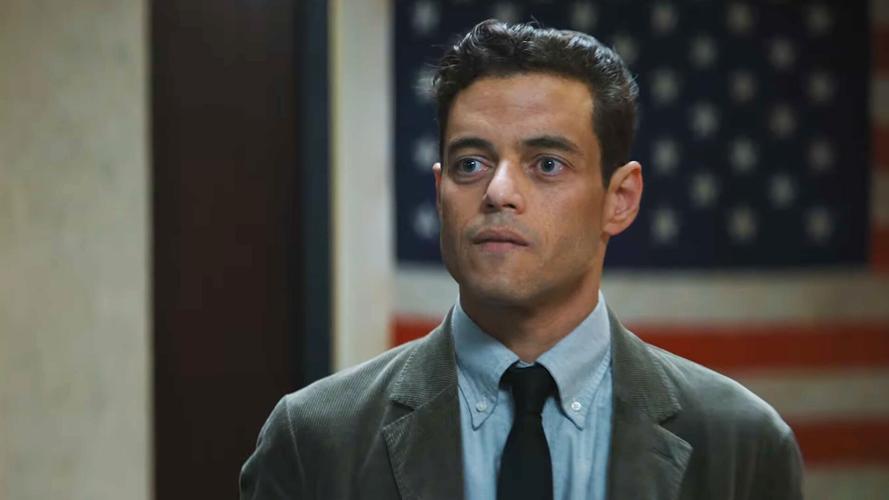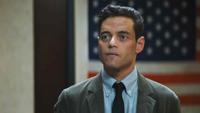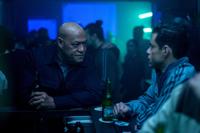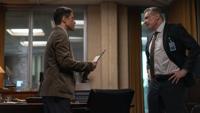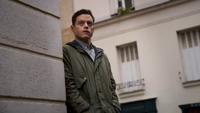Robert Littell is an author, comparable to John le Carré or Ian Fleming. He writes spy novels or espionage thrillers. He perhaps isn't as successful as either, or even someone like Robert Ludlum whose books were adapted by Hollywood more, including the highly popular The Bourne Identity (2002). Littell did have some attention to the silver screen. The book on which this film is based was adapted previously in 1981. This remake comes nearly 45 years later. There are some things that are different from that 1981 version and this post 9/11 and post Cold War version.
Rami Malek (Bohemian Rhapsody and Mr. Robot) stars as Charlie Heller, an employee at the CIA. He works for the agency's "Decryption and Analysis" department. He works on figuring out computer code and data. He's a tech guy. He mainly sits at a desk in front of a digital screen. He's not like field agents who need to know how to fight or shoot weapons. He doesn't have to be this overly masculine ideal that are exemplified with characters like Jason Bourne or James Bond. He can essentially be a nerd and Charlie is one. When a terror attack in London kills his wife, Sarah, played by Rachel Brosnahan (The Marvelous Mrs. Maisel and House of Cards), this prompts Charlie to come from behind his desk and go into the field. The question becomes whether the geek can quickly transition into a field agent who will find his wife's killer, a man who is very powerful and an international villain. The question also becomes if Charlie will be able to get revenge and actually kill the man.

Laurence Fishburne (Man of Steel and The Matrix) co-stars as Colonel Anderson, an older field agent who becomes responsible for training Charlie to be a spy who can kill at will. Anderson is the complete opposite of Charlie. Anderson is a well-trained fighter and marksman who has no trouble ending someone's life. Anderson believes that Charlie is absolutely incapable of going into the field and getting the revenge he desperately wants. Anderson recognizes that Charlie has other skills, such as Charlie's mechanical abilities that allow him to take apart a machine like an airplane's engine and put it back together. Anderson doubts those skills are enough to accomplish what Charlie wants to accomplish. However, when Charlie goes rogue, it's up to Anderson to go after Charlie and have him put those skills to the test.
When it comes to Charlie going rogue and going for revenge, this film seems to want to have its cake and eat it too. It wants to be this revenge film where Charlie goes on a murder spree, but it also wants to have him not be as problematic a character as Charles Bronson's role in Death Wish (1974). There have been tons of revenge films, but often the protagonists in which don't struggle with the morality of murder that Charlie does. The film goes out of its way to underline that Charlie isn't capable of murder, that he isn't actually a killer, at least not one who does so at point blank range or with his bare hands. The film then has the deaths play out as either accidents or mouse-traps that try to put some distance between Charlie and those killings. I don't think the film puts enough distance to make the struggle with morality feel solid here. The struggle with morality is in fact a pretense here.

Holt McCallany (Mindhunter and Lights Out) also co-stars as Chief Moore, one of the directors at the CIA. He's basically Charlie's boss before Charlie goes rogue. He then sets out to find Charlie and stop him. It's revealed that he's a corrupt figure at the agency. In order to get revenge, it seems Charlie might have to become just as corrupt. This film's track feels like it's one charting Charlie's descent and what the cost of his descent would be. That descent is also a bit of a mirage or another pretense. Instead of seeing that Charlie is no better than Moore, particularly when it comes to a character named Inquiline, we're meant to think that Moore is yet another villain and Charlie is the pure one.
We're led to think that Charlie is simply a man seeking justice against forces that are possibly untouchable or protected by powerful government or international forces, so whatever Charlie has to do to achieve his goals, then it's okay. It's the end justifying the means in effect. This isn't inherently interesting beyond how such a man would operate in a highly digital world and highly technological one. It's not great that it traffics in this idea of fridging, but obviously that comes from Littell's book, which was written over 40 years ago, so a lot of old world ideas still persist here.

Rated PG-13 for some strong violence and language.
Running Time: 2 hrs. and 3 mins.
In theaters.

